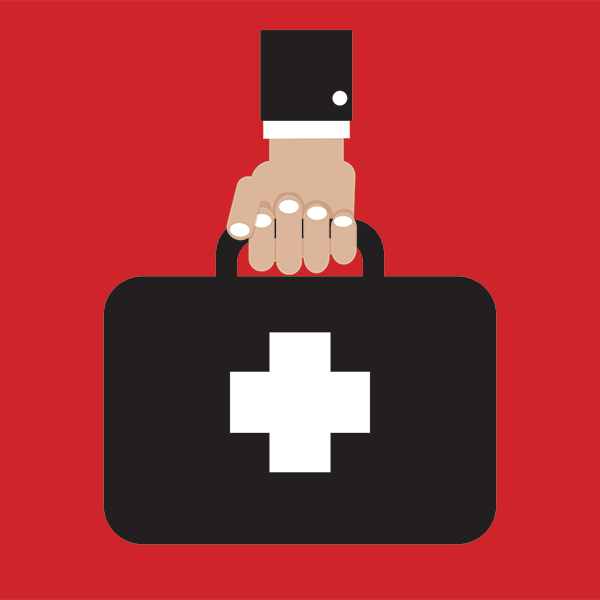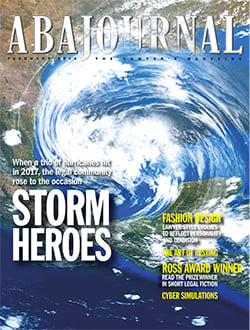Social media unites lawyers to help those in need
FLORIDA LEADS THE WAY
In the e-governance realm—leveraging information technology for government services and operations—Florida is leading the way for court systems.
Florida’s judiciary didn’t miss a beat when concerns about power surges prompted the controlled shutdown of servers, based in the state supreme court’s building in Tallahassee, on which a number of courts around the state have websites, email systems and online dockets. The high court immediately went to Twitter and Facebook to get out news on closings, extended deadlines and other need-to-know storm-related information for both lawyers and the public.
The court’s Facebook page even had a mustard-yellow logo, known as an event brand, to click for information on closures around the state. Florida’s court system was early to the social media game and is considered the leader nationwide.
“It struck me this time that social media became the go-to way of communicating during the storm,” says Craig Waters, the Florida Supreme Court’s public information officer for the past 30 years. “Their use is extremely controversial around the country and some other courts tell me they’ll never adopt it. I have felt l was a voice crying in the wilderness.”
The supreme court began using Twitter in 2009 and now includes Facebook, Instagram, YouTube and LinkedIn, though Twitter and Facebook are the workhorses for breaking news and information.
According to the National Center for State Courts, the judicial branches of 37 states and territories have some kind of social media footprint, while individual courts in some other states might do so on their own. Many courts and judges around the country are reluctant to use Facebook because of various ethical concerns—such as the term “friends” possibly rubbing against their need to be impartial.
Court challenges along that line, including one ongoing in Florida, concern individual judges on their personal Facebook pages having as “friends” lawyers who practice before them. The ABA issued Formal Opinion 462 in 2013 advising judges that they should disclose such a relationship when appropriate, but that they need not search through all of their social media connections if they’re not aware of one that might be problematic.
A MODEL GUIDE FOR OTHER STATES
In 2015, Florida’s supreme court adopted a communications plan for the state judiciary to be implemented by the Florida Court Public Information Officers association. Last March, the FCPIO in turn adopted detailed model policies and guidelines for using social media, such as user agreements concerning content, and caveats such as nonendorsement of external hyperlinks.
“Florida’s communications plan is truly unique,” says Blake Kavanagh, an analyst with the National Center for State Courts. “It’s a model guide for other states looking to improve and coordinate their judicial communications system.”
When servers were down as Irma wended its way up the state, the Florida Bar and the supreme court got a lot of social media inquiries about bar exam results, which had been scheduled for release the following week. There were concerns that the bar examiners, who work in Tallahassee, would be delayed in tallying scores.
Waters sent out word via Twitter and Facebook on Sept. 13, in the still-fresh aftermath of Irma, that results would be posted as planned on Sept. 18. Of the 3,247 July test takers, 1,553 passed. Their anxiousness, and probably that of friends and family, was obvious: The court’s Facebook post announcing there would be no delay got 29,000 hits.
“That’s the most hits we’d ever gotten for a page,” says Waters.
Disaster Response Resources
ABA Resources
• ABA Committee on Disaster Response and Preparedness
Volunteering Opportunities
Florida attorneys can visit the Florida Bar Foundation to find post-storm volunteer opportunities for legal aid and pro bono attorneys, or visit Florida Pro Bono Matters.
North Carolina attorneys can find info on volunteering on the North Carolina Bar's Hurricane Florence page.
South Carolina attorneys can volunteer for the South Carolina Bar's disaster relief legal service hotline by filling out this form.
Not licensed in those states but looking to donate your time or money? Check out ambar.org/DisasterRelief.
ABA Journal Coverage
Hurricane Heroes: From the February 2018 issue
Legal community meets relief challenges after hurricanes Harvey and Irma
ABA mobilizes aid to Puerto Rico and the Virgin Islands
Lessons from Katrina
Social media unites lawyers to help those in need

For our latest natural disaster coverage, click here.
Disaster Helplines
The Disaster Distress Helpline (DDH) is a national hotline dedicated to providing year-round disaster crisis counseling. This toll-free, multilingual, crisis support service is available 24/7 via telephone (1-800-985-5990) and SMS (text 'TalkWithUs' to 66746) to residents in the U.S. and its territories who are experiencing emotional distress related to natural or man-made disasters.
For low-income individuals with disaster-related legal needs, the following phone numbers are available:
North Carolina residents: 1-833-242-3549
South Carolina residents: 1-877-797-2227 ext. 120
Virginia residents:
1-804-775-0808 in the Richmond area, or 1-800-552-7977.
Florida residents: 1-866-550-2929.
The Florida Bar—all lawyers licensed to practice in the state must be members—redirected its always busy Facebook and Twitter accounts to deal strictly with Hurricane Irma-related matters.
“When the storm hit, we shut off everything else—bar news, social events, legal humor,” says Danny Aller, the bar’s public information coordinator for social media. Instead, they focused on the storm’s location, where to find relief when it passed, and how to volunteer legal aid to victims. The mix also was geared as much to the public as it was to the legal community, instead of the usual 80/20-percentage split toward lawyers.
One post gave a phone number to call and speak with a volunteer lawyer for storm-related legal help.
“That was shared 400 times,” Aller says. “On Facebook, that’s a crazy number for a bar association. It let us know the average person was finding it and sharing it.”
The state bar’s page averages 40,000 to 50,000 views in a 24-hour period, and the number grew to 300,000 during Hurricane Irma. The average of 15 posts daily nearly doubled.
In Texas, the court system relied on Twitter but not Facebook during Hurricane Harvey, tweeting news about court closures, legal aid hotlines and other storm-related information, says Megan LaVoie, public affairs director and special counsel for the Texas Office of Court Administration.
“It’s amazing how the message on social media can spread like wildfire in these crisis situations,” LaVoie says. “There’s no other tool like it.”




